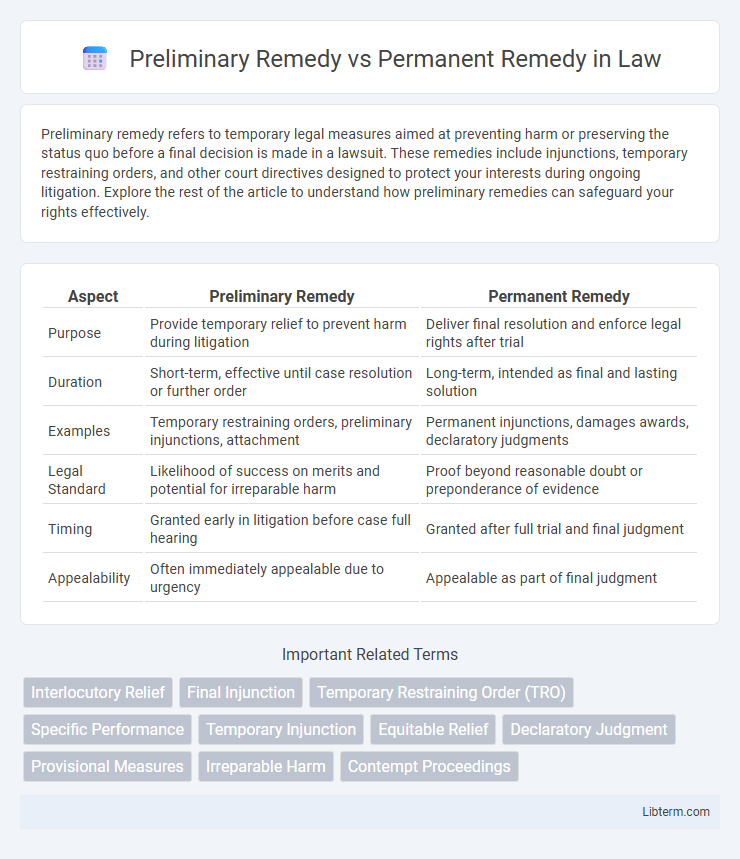Preliminary remedy refers to temporary legal measures aimed at preventing harm or preserving the status quo before a final decision is made in a lawsuit. These remedies include injunctions, temporary restraining orders, and other court directives designed to protect your interests during ongoing litigation. Explore the rest of the article to understand how preliminary remedies can safeguard your rights effectively.
Table of Comparison
| Aspect | Preliminary Remedy | Permanent Remedy |
|---|---|---|
| Purpose | Provide temporary relief to prevent harm during litigation | Deliver final resolution and enforce legal rights after trial |
| Duration | Short-term, effective until case resolution or further order | Long-term, intended as final and lasting solution |
| Examples | Temporary restraining orders, preliminary injunctions, attachment | Permanent injunctions, damages awards, declaratory judgments |
| Legal Standard | Likelihood of success on merits and potential for irreparable harm | Proof beyond reasonable doubt or preponderance of evidence |
| Timing | Granted early in litigation before case full hearing | Granted after full trial and final judgment |
| Appealability | Often immediately appealable due to urgency | Appealable as part of final judgment |
Introduction to Legal Remedies
Preliminary remedies provide immediate, temporary relief to preserve the status quo and prevent harm before a full trial can occur, typically granted through injunctions or temporary restraining orders. Permanent remedies, such as damages or specific performance, are awarded after a final judgment and aim to fully resolve the dispute by addressing the underlying rights and obligations. Understanding these distinctions is essential in civil litigation to ensure appropriate legal strategies and protections are pursued at various stages of a case.
Defining Preliminary Remedies
Preliminary remedies are temporary court orders designed to preserve the status quo and prevent irreparable harm before a final decision is reached in a lawsuit. They include injunctions, restraining orders, and attachments that provide immediate relief and protect parties' rights during litigation. These remedies ensure that evidence remains intact and the ultimate effectiveness of a permanent remedy is not compromised.
Understanding Permanent Remedies
Permanent remedies provide long-lasting solutions to legal disputes by addressing the root cause of the issue, ensuring sustained relief and enforcement. Unlike preliminary remedies, which are temporary measures intended to maintain the status quo during litigation, permanent remedies result from a final court judgment or settlement that conclusively resolves the matter. Understanding permanent remedies involves recognizing their role in delivering definitive justice, including injunctions, specific performance, or monetary damages that are enforceable over time.
Key Differences Between Preliminary and Permanent Remedies
Preliminary remedies are temporary court orders designed to maintain the status quo and prevent irreparable harm before a final decision is made, such as temporary restraining orders or preliminary injunctions. Permanent remedies are final, binding decisions issued after a full trial or hearing that resolve the dispute by awarding damages, specific performance, or permanent injunctions. The key difference lies in timing and purpose: preliminary remedies provide immediate, short-term relief, while permanent remedies offer conclusive and enforceable solutions.
Common Types of Preliminary Remedies
Common types of preliminary remedies include temporary restraining orders, preliminary injunctions, and attachment orders, which aim to preserve the status quo and prevent irreparable harm before a final decision. Temporary restraining orders provide immediate, short-term relief, typically lasting days to weeks, while preliminary injunctions offer extended protection until the case concludes. Attachment orders secure assets to satisfy potential judgments, ensuring enforcement of the court's final remedy.
Typical Permanent Remedies in Law
Typical permanent remedies in law include injunctions, monetary damages, and specific performance, designed to provide lasting solutions to legal disputes. Injunctions prevent ongoing or future harm by ordering a party to act or refrain from specific actions, while monetary damages compensate for losses incurred due to breaches or torts. Specific performance compels parties to fulfill contractual obligations when monetary damages are inadequate, ensuring the enforcement of precise contractual terms.
Criteria for Granting Preliminary Remedies
Preliminary remedies are granted based on the likelihood of success on the merits, the possibility of irreparable harm without the remedy, and the balance of equities favoring the requesting party. Courts assess whether the moving party demonstrates a substantial case and if immediate relief is necessary to prevent harm that cannot be rectified by monetary damages alone. Permanent remedies, in contrast, require full adjudication of the case and typically address final relief after all evidence and arguments have been presented.
Process for Obtaining Permanent Remedies
The process for obtaining permanent remedies involves a detailed legal procedure following the initial grant of preliminary remedies to preserve the status quo. Courts require comprehensive evidence demonstrating the necessity and appropriateness of a permanent injunctive relief or damages to resolve the underlying dispute fully. This process typically includes a full trial on the merits, where parties present factual and legal arguments for permanent resolution.
Importance of Choosing the Right Remedy
Selecting the appropriate remedy, whether preliminary or permanent, is crucial for effective legal resolution and resource management. Preliminary remedies provide immediate relief or protection during litigation, while permanent remedies ensure final enforcement or compensation after a thorough judicial determination. Misjudging the remedy type can lead to inadequate protection or unnecessary delays, impacting case outcomes and client satisfaction.
Conclusion: Weighing Preliminary vs Permanent Remedies
Evaluating preliminary remedy versus permanent remedy reveals that preliminary remedies offer immediate protection and preserve the status quo until a full hearing, while permanent remedies provide conclusive and enforceable resolutions after thorough litigation. The choice hinges on the urgency of harm, the availability of evidence, and the long-term objectives of the parties involved. Courts balance factors such as likelihood of success, potential damage, and public interest to determine the appropriate remedy.
Preliminary Remedy Infographic

 libterm.com
libterm.com